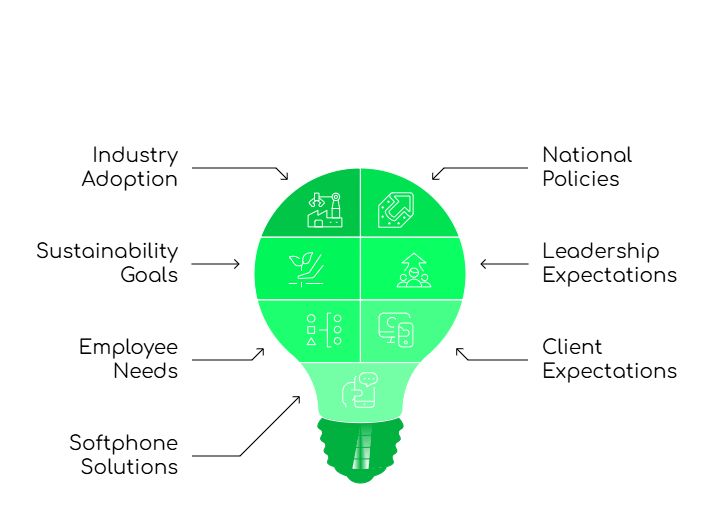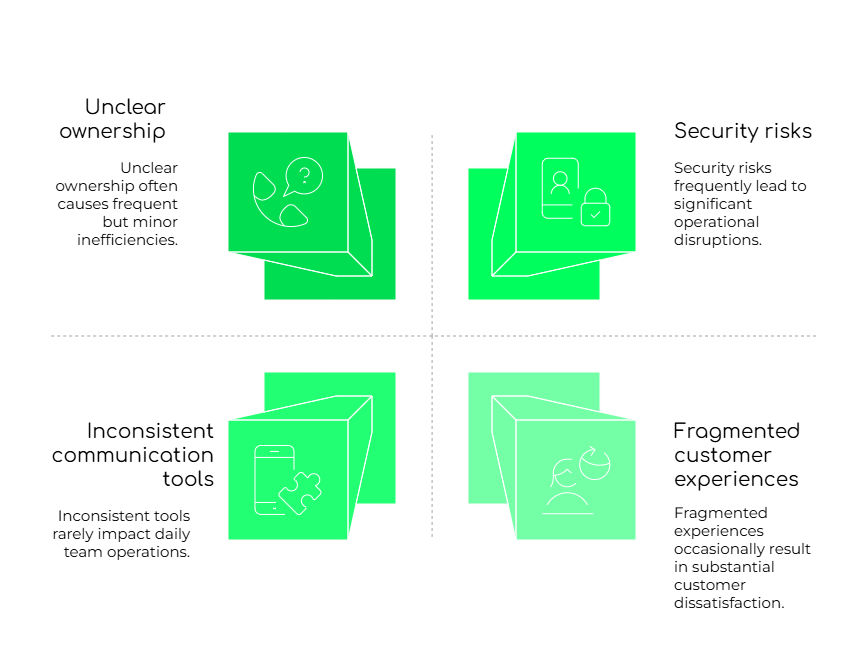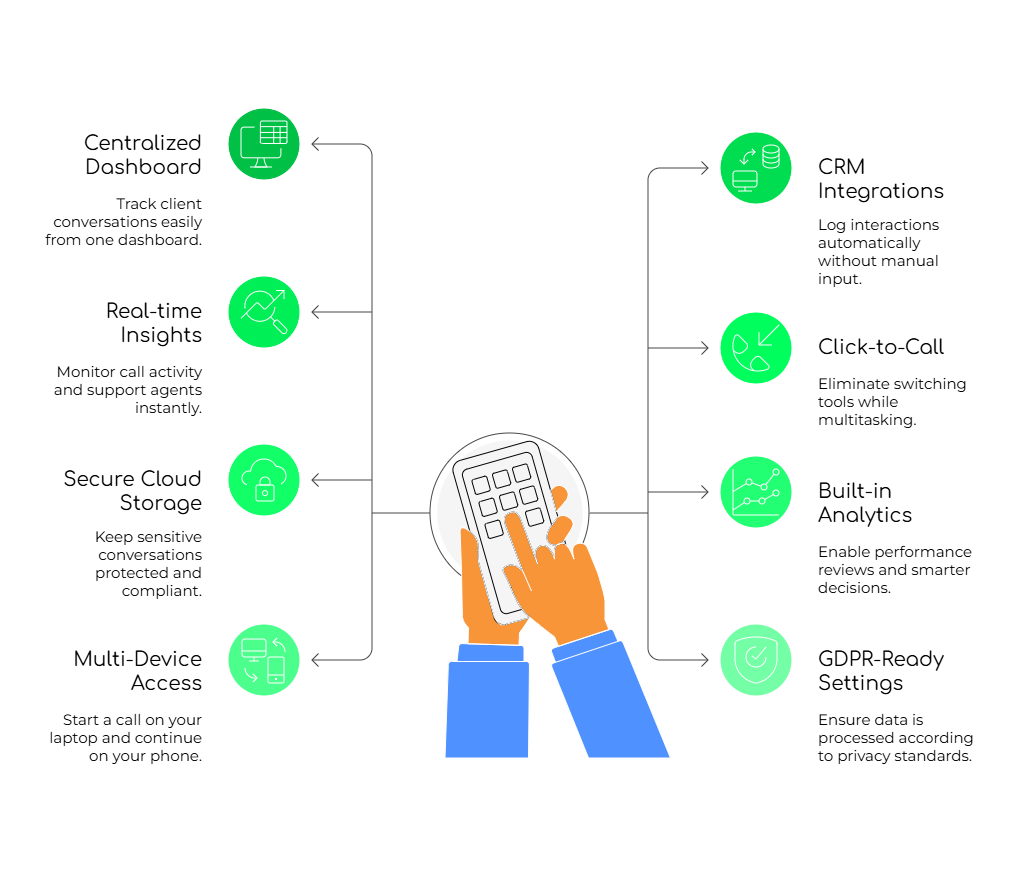Can teams spread across Oslo, Bergen, and Trondheim stay as connected as those sharing the same office? That’s the question many Norwegian companies are asking as remote work cements itself into long-term business strategies. With flexibility and distributed talent now standard, the real challenge lies in how well teams stay aligned and responsive, especially when relying on different tools, locations, and work hours. When communication starts to break down, productivity and customer experience are the first to suffer. Too many apps, scattered updates, and missed calls create confusion. That’s why a smart, business-grade Softphone Implementation is no longer optional; it’s the glue that keeps distributed teams operating like one.
Norwegian companies are realizing that it takes more than chat platforms or video meetings to build an efficient remote culture. Softphones, digital calling tools designed for business, are emerging as a smarter, more structured solution. Softphones allow businesses to unify communication without sacrificing mobility or user control. They offer the kind of reliability and auditability that traditional phones and consumer-grade apps can’t match. And for Norwegian teams that prioritize security, multilingual support, and seamless collaboration, the benefits go far beyond just call quality. With a proper softphone strategy, teams stay connected, productive, and ready to scale.
Table of contents
Why Are Remote Teams on the Rise in Norway?
Remote work is no longer a short-term response to global disruption; it’s a permanent shift. In Norway, industries like IT, education, finance, and consulting have embraced distributed models to access broader talent and boost employee satisfaction. Companies are redesigning their workflows to support hybrid and remote-first environments. This transformation is supported by national policies encouraging digital innovation and flexible employment. As seen in the Norwegian government’s commitment to digital infrastructure, businesses are now expected to operate efficiently regardless of physical presence. Remote work is part of a broader push toward sustainability, work-life balance, and regional equity.

Traditional systems weren’t built for this level of flexibility, which is why modern teams are turning to Softphone Implementation as a practical solution. It gives everyone from managers to agents the clarity, speed, and structure needed to communicate efficiently without missing a beat. All of this depends on a company’s ability to manage internal communication with structure, speed, and flexibility. Softphones fit naturally into this environment. They reduce dependency on physical hardware, minimize maintenance costs, and allow teams to communicate professionally from anywhere, even in compliance-heavy industries like healthcare and banking.
Common Communication Challenges in Distributed Workforces
Even the most agile remote teams run into recurring challenges when communication systems aren’t centralized or scalable. Norwegian businesses have reported a few key friction points:

- Unclear ownership of calls and tasks leads to duplicate follow-ups or missed responses.
- Inconsistent communication tools across departments make it difficult to find past conversations.
- Lack of visibility into performance prevents team leads from offering coaching or feedback in real time.
- Security risks rise when teams use personal phones or unsecured calling apps.
- Fragmented customer experiences occur when there’s no shared process or communication log.
These issues cause confusion, delay growth, and weaken customer trust. Over time, they also increase operational costs by forcing teams to revisit problems, redo tasks, or manage unnecessary back-and-forth communication.
This is where Softphone Implementation becomes essential, enabling secure call logging, role-based access, and encrypted storage that aligns with regional and international regulations. It’s not just about better communication; it’s about safeguarding trust and ensuring every interaction meets industry standards.
Why FreJun Is Built for Remote Collaboration
FreJun gives remote teams the structure they need to stay consistent, accountable, and fully aligned.

- One dashboard for all calls makes it easy to track every client conversation.
- CRM integrations ensure all interactions are logged without manual input.
- Real-time insights help team leads monitor call activity and support agents instantly.
- Click-to-call from any system eliminates the need to switch tools while multitasking.
- Secure cloud storage keeps sensitive conversations protected and compliant.
- Built-in analytics enable performance reviews, call trend analysis, and smarter business decisions.
- Multi-device access allows users to start a call on their laptop and continue from their phone, without missing a beat.
- FreJun gives remote teams the structure they need to stay consistent, accountable, and fully aligned. Its emphasis on bold Softphone Implementation ensures streamlined communication that scales with your business.
FreJun doesn’t just add convenience, it adds consistency, which is often the missing link in remote team success.
Key Features That Empower Norwegian Teams

FreJun supports the needs of modern, distributed teams operating in the Norwegian market with built-in flexibility, control, and a focus on strong, reliable Softphone Implementation.
- Automatic call recording and tagging improve knowledge sharing across departments.
- Mobile and desktop access ensures team members can stay connected from anywhere.
- Role-based permissions protect data while enabling collaboration.
- Quick setup and onboarding get teams up and running with minimal IT support.
- Caller ID masking and number portability maintain brand consistency while supporting global expansion.
- Call scheduling tools allow users to plan, book, and execute meetings with built-in reminders and availability tracking.
- Team-wide contact directories centralize contact management and reduce communication delays.
By offering these features natively without third-party dependencies, FreJun makes softphone adoption both simple and scalable, supporting Norway’s commitment to secure, user-controlled digital services as outlined in the Norwegian National Cyber Security Strategy.
Business Benefits of FreJun’s Softphone Solution
FreJun’s softphone solution gives Norwegian businesses a distinct edge by combining professional-grade features with local adaptability. It simplifies communication across remote teams, reduces operational friction, and strengthens client relationships through consistent, high-quality interactions.

1. Local Adaptability
The platform respects regional dialing patterns, time zones, and communication norms, making cross-city collaboration feel local, all backed by a robust and reliable Softphone Implementation that simplifies operations from day one.
2. Productivity Gains
FreJun reduces time spent switching tools or tracking down updates, helping teams stay focused and efficient. Unified call history and instant notes help agents follow up faster, while real-time alerts keep managers informed without micromanaging.
3. Scalable Communication Infrastructure
Whether managing 5 or 50 agents, FreJun scales without the complexity of traditional phone systems. Administrators can add or remove users, assign roles, and monitor usage all from a simple control panel.
4. Better Customer Experience
With call tracking and CRM syncing, customer conversations stay informed, consistent, and easy to follow. FreJun also allows for contextual notes, enabling teams to personalize responses and build stronger relationships.
5. Reliable Support and Security
FreJun offers enterprise-grade security and responsive support to help Norwegian businesses operate with confidence. From encryption to compliance tools, the platform is built with security-first principles, and support is always just a click away.
Key Takeaways

Norwegian companies navigating the shift to remote work need more than video calls and scattered communication apps; they need a clear, centralized system that brings structure to how teams connect and collaborate. As businesses scale, the complexity of managing calls, follow-ups, and customer expectations increases. Without a unified platform, it’s easy for things to slip through the cracks. A solid Softphone Implementation solves this by turning communication into a well-managed, traceable, and performance-driven part of daily operations. Teams become more responsive, accountable, and efficient when every call, note, and decision is tracked and easily accessible.
FreJun brings this level of clarity to Norwegian businesses of all sizes. It combines enterprise-grade features with local adaptability, giving teams the power to communicate seamlessly from anywhere while maintaining professionalism and compliance. From click-to-call and CRM syncing to multilingual support and analytics, FreJun turns every remote interaction into a measurable business asset. Whether you’re running a distributed support center or scaling a client-facing team, FreJun ensures communication is no longer a bottleneck but a catalyst for smarter, faster growth.
Final Thoughts

Norway’s digital transformation continues to accelerate, and communication is at the center of that journey. For remote teams to truly succeed, they need tools that simplify collaboration, protect data, and allow for real-time oversight. That’s where a business-grade softphone platform becomes essential.
FreJun gives Norwegian teams the structure they need to operate like one unified unit, even across distances. With security, speed, and simplicity built in, this Softphone Implementation transforms everyday calls into high-impact interactions, keeping remote teams aligned, efficient, and ready to grow.
FreJun doesn’t just solve current communication problems; it prepares teams for the future. As companies scale, expand internationally, or adapt to new regulations, FreJun grows with them. With minimal training, flexible pricing, and seamless integrations, it’s a solution designed for long-term impact.
Further Readings – Virtual Phone Solutions for Sweden-US Business Communication
FAQ
FreJun provides a single dashboard where all calls, logs, and notes are tracked in real time, keeping everyone on the same page.
FreJun uses enterprise-level encryption and GDPR-compliant data handling to keep all communication protected and confidential.
FreJun integrates directly with CRMs and offers click-to-call functionality, helping teams save time and avoid distractions.
FreJun is built to scale from five agents to fifty, with quick setup, role-based access, and full visibility across all operations.
FreJun’s intuitive interface, along with full support in local languages, makes onboarding fast and frustration-free for any team.
